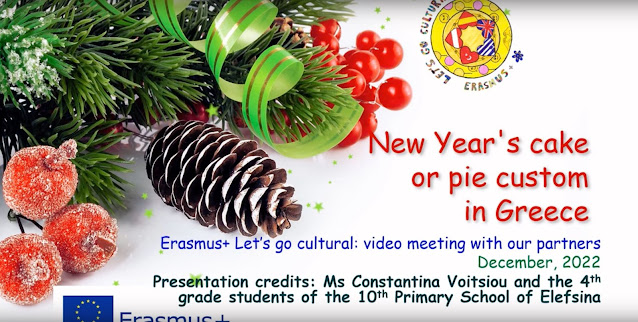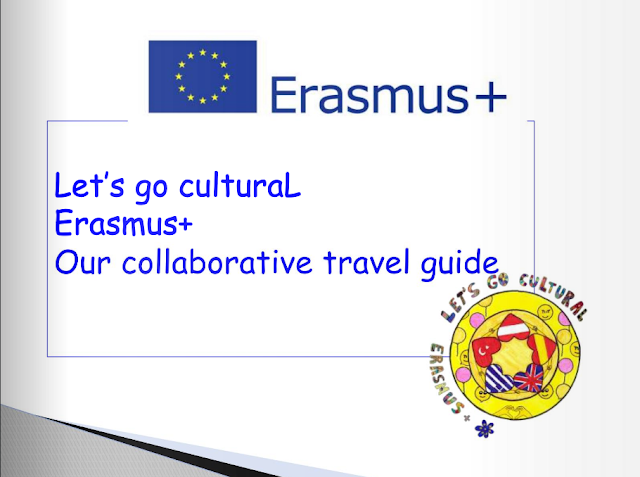A short summary of our project
“LET’S GO CULTURAL” intends to involve students aged 6-11 from the 5 different partner schools and assist them in developing 21st century skills and competences. The innovation of our project lies on the fact that the use of ICT in education will be increased, the learning for foreign languages will be fostered and the quality of education will be improved. Through the activities students will delve into their own culture, accept and adopt its values and become reflective towards it. At the same time, they will be open and receptive towards EU cultures and feel that it is their duty to protect, preserve and spread out our EU cultural heritage. Students will cooperate in multi-cultural teams and student minorities will be integrated. The participant teachers are knowledgeable about the fact that there is a great need for the school curricula to be changed in order to meet student and society needs. To this end, we intend to incorporate the use of ICT into our learning and teaching processes.
We plan on keeping our students more involved and enhance learning and teaching outcomes.
We plan on keeping our students more involved and enhance learning and teaching outcomes.
The objectives we want to reach are:
1st: Promote and advance student responsibility of about 250 students of the EU schools to preserve and safeguard the European culture and cultural heritage during the period of September 2019 until August 2021
2nd: Encourage an intercultural dialogue among learners and teachers
3rd: Create and develop activities which combine learning, language learning with European cultural heritage
4th: Form a EU community consisting of teachers and students
5th: Improve students ICT, language skills and students school performance
6th: Achieve inclusion and acceptance of students of different cultural backgrounds
Our project invites students to experiment, create, be innovative. The final tangible outcomes of our project will be: five presentations “Let’s get to know each other”- introducing each other, our project logo, 5 videos which will deal with the local cuisine, crafts and traditions, 1 Recipe e-book, 1 picture dictionary with our languages, 1 digital graffiti wall with ART, 1 project website, a Facebook group page, a travel guide, 1 EU history festival, 5 culture games, 2 e-newsletters, an e-Twinning project, a DVD which will include samples and a collection of examples with Active learning activities which combine cultural heritage with education.
There are different groups which will take part in the project. The students are about 200 and their age ranges between 8 and 12. There will be a number of 120 teachers who will participate and contribute to the project, members of the staff (librarians, school counselors, accountants), 250 families, and about 150 representatives of the City Hall, local communities, local media, Local library and clubs, etc. The group of teachers who will participate in the mobilities are 60 teachers.
The philosophy of our project rests on the belief of a school open to community and society and on involvement of the greatest possible number of people. There will be formal and informal approaches.
To this end, teachers attending mobilities will share their experiences with their colleagues and students during information sessions, focus groups and classes. All partner teachers will work and interact with students in participant schools, while, at the same time, there will be online meetings with students from the other partner countries. Materials will be created through interaction and
collaboration. Student minorities will be integrated into student groups and will become equal parts of the teams. We regard shared information gained form first-hand experience as extremely important both for the school atmosphere and the cooperation. Furthermore, the students will wear and present the traditional costumes of their countries. This will acquaint them with costumes and traditions of other European countries. The variety of the activities responds to all students learning styles and preferences and this renders our project innovative and paves the way for the spirit of collaboration, interaction and active learning both at school and in the work place.
We 5 short-term joint staff training events planned, have clearly set objectives and all participants will take initiatives in order for the activities involved to reach the the appropriate aims. It will be a meaningful experience for all. Before each meeting a needs and expectations and fears analysis will be carried out by means of questionnaires. The results will assist in creating adequate and focused activities for the project. Students’ behavior will be monitored throughout the activities and they will also be encouraged to share their feelings and experiences.
Taking into consideration the whole layout and design as well as implementation of our project, we believe that our project will have far-reaching results for all participant members and schools.
1st: Promote and advance student responsibility of about 250 students of the EU schools to preserve and safeguard the European culture and cultural heritage during the period of September 2019 until August 2021
2nd: Encourage an intercultural dialogue among learners and teachers
3rd: Create and develop activities which combine learning, language learning with European cultural heritage
4th: Form a EU community consisting of teachers and students
5th: Improve students ICT, language skills and students school performance
6th: Achieve inclusion and acceptance of students of different cultural backgrounds
Our project invites students to experiment, create, be innovative. The final tangible outcomes of our project will be: five presentations “Let’s get to know each other”- introducing each other, our project logo, 5 videos which will deal with the local cuisine, crafts and traditions, 1 Recipe e-book, 1 picture dictionary with our languages, 1 digital graffiti wall with ART, 1 project website, a Facebook group page, a travel guide, 1 EU history festival, 5 culture games, 2 e-newsletters, an e-Twinning project, a DVD which will include samples and a collection of examples with Active learning activities which combine cultural heritage with education.
There are different groups which will take part in the project. The students are about 200 and their age ranges between 8 and 12. There will be a number of 120 teachers who will participate and contribute to the project, members of the staff (librarians, school counselors, accountants), 250 families, and about 150 representatives of the City Hall, local communities, local media, Local library and clubs, etc. The group of teachers who will participate in the mobilities are 60 teachers.
The philosophy of our project rests on the belief of a school open to community and society and on involvement of the greatest possible number of people. There will be formal and informal approaches.
To this end, teachers attending mobilities will share their experiences with their colleagues and students during information sessions, focus groups and classes. All partner teachers will work and interact with students in participant schools, while, at the same time, there will be online meetings with students from the other partner countries. Materials will be created through interaction and
collaboration. Student minorities will be integrated into student groups and will become equal parts of the teams. We regard shared information gained form first-hand experience as extremely important both for the school atmosphere and the cooperation. Furthermore, the students will wear and present the traditional costumes of their countries. This will acquaint them with costumes and traditions of other European countries. The variety of the activities responds to all students learning styles and preferences and this renders our project innovative and paves the way for the spirit of collaboration, interaction and active learning both at school and in the work place.
We 5 short-term joint staff training events planned, have clearly set objectives and all participants will take initiatives in order for the activities involved to reach the the appropriate aims. It will be a meaningful experience for all. Before each meeting a needs and expectations and fears analysis will be carried out by means of questionnaires. The results will assist in creating adequate and focused activities for the project. Students’ behavior will be monitored throughout the activities and they will also be encouraged to share their feelings and experiences.
Taking into consideration the whole layout and design as well as implementation of our project, we believe that our project will have far-reaching results for all participant members and schools.




Comments
Post a Comment